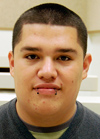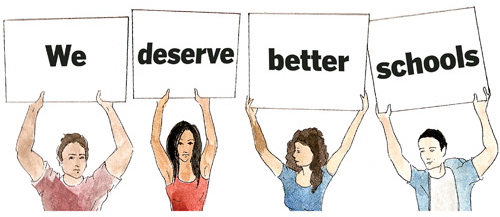We deserve better schools
This school year students from Crenshaw, Manual Arts, Roosevelt, Wilson and Locke high schools worked with graduate students from UCLA to examine the quality of their education. They learned how to research and also interviewed students, teachers and administrators about problems at their schools and how they thought things could be improved. The students presented their findings to their schools and even at a national education conference in New Orleans. L.A. Youth liked how the students on the Council of Youth Research were demanding a better education, and we wanted to share what two of them learned.

Bernardo says schools need modern technology because students need to know how to use it in college.
I always thought I was receiving a high-quality education, until I joined the Council of Youth Research in the summer of 2009. I joined because some of my favorite 10th grade teachers were in danger of being laid off and I felt like joining the council was a way to speak up for Crenshaw students and the teachers who genuinely care for us.
Being on the council was challenging that first summer because we were doing college-level reading and research. But once I caught up, I liked how it was nothing like regular classwork. We worked in groups and I enjoyed the college environment at UCLA. Last year we studied how the economic crisis affects students’ education and ability to go to college. This year we focused on the availability of resources like books, computers and counselors.
After interviewing and surveying more than 1,000 students, our group learned that Crenshaw students don’t have access to updated technology. The majority of our computers at Crenshaw are still running Windows XP, which was created in 2001. Also, teachers don’t assign work that requires students to use computers in the classroom, instead they teach only from textbooks. Out of seven classes I’m taking this semester, I’ve had to use computers in only two classes. In math class we researched statistics and in my English class we had to find information to support a persuasive essay. This affects my classmates and me because we need to know how to use the latest technology to succeed in college and once we have jobs. Teachers can help by requiring us to type our reports or assigning more research projects. Research projects are important because you learn to tell the difference between a trusted Internet source and an unreliable Internet source.
Our textbooks didn’t teach about our culture
Another problem we came across was that our textbooks are not culturally relevant. One day my classmate and I were going through our algebra book and we noticed that all the word problems were related to factory jobs. Instead, books should have word problems about jobs like engineering that reflect the high expectations everyone should have for all students, even urban students. And our history books teach mostly about European people and refer to people of color as immigrants and/or slaves. This makes students like me feel like we’re not important. And it leads to us not knowing about our own cultures. My parents shouldn’t have to teach me about the Mexican Revolution or people like Emiliano Zapata, a leader in the Mexican Revolution. My African American and Latino classmates and I want to know our history!
Through our research we learned that one of the biggest obstacles schools face in providing an excellent education is the unequal distribution of resources. During our summer research we went to Beverly Hills High School and noticed that they have a whole science building filled with materials like models and dead animals for dissections. Crenshaw has just one science floor and is always short on materials. In my chemistry class, we had to take turns doing labs because there weren’t enough materials for everyone to do the labs at the same time.
When our principal saw a presentation about our findings, she just congratulated us. At the time I felt like she did that because she felt challenged by our demands for better technology and more relevant curriculum. The following week though, she sent two of us a card saying we made her proud and that she would try her best to give us access to better technology. However, that was all that happened; we still use the same old computers.
A teacher listened to our ideas
On the other hand, my English teacher attended our presentations and I’ve noticed that he started assigning research papers that must be typed and require research on the Internet. I asked him why he changed and he said that he had always felt that he should require us to use computers more, but our presentation gave him a push. Students say they like the idea of using technology to make the class more interesting.
The most important lesson I’ve learned by participating in the Council of Youth Research is to fight for what you believe in or what you deserve, even when people don’t take you seriously.
Editor’s note: L.A. Youth would like give special thanks to Nicole Mirra of UCLA for helping us publish this story.








1 Comment
I commend you on becoming informed on how important education is and how much more difficult it is to get. I just wanted to point out that even schools like Beverly Hills High School don’t have the resources you implied. There is a new science building, but when labs are done, it’s in groups of about 5 students, which means individual experience is pretty much not there. As an alumnus of the school, I can also say that the flashy building with what seems like great resources must have had the sole intention to please donors to the school, since it did not enrich the academic experience as I was there. All public schools are under a crunch, and even Beverly Hills cuts everything that doesn’t improve its chances of getting donations for things kids don’t need. (i.e new track field while counselors jobs are cut, etc)
Our country’s education system is outdated and Euro-centric, which I hope can improve even with all the current budget cuts. Unfortunately the best education right now is most likely independent or through organizations like the one you joined.